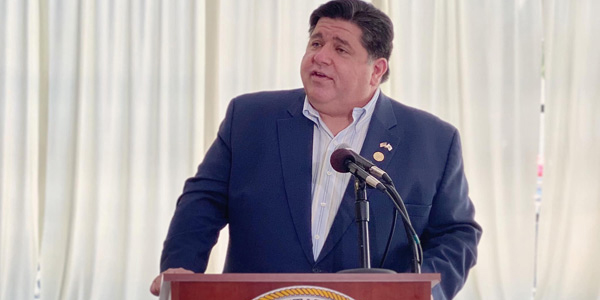Exelon said Thursday that it will next year close two Illinois nuclear plants that face hundreds of millions of dollars of revenue shortfalls because of declining energy prices.
In a statement, Exelon said it must close the plants because of “market rules that allow fossil fuel plants to underbid clean resources in the PJM capacity auction, even though there is broad public support for sustaining and expanding clean energy resources to address the climate crisis.”
The Byron nuclear plant is slated to close in September 2021, while the Dresden plant will shut down in November 2021, the company said.
“Today’s unfortunate announcement comes after a long fight to keep these nuclear plants online,” said Maria Korsnick, CEO of the Nuclear Energy Institute. “These closures not only will prevent Illinois from meeting its clean energy goals, but ultimately will keep our nation from reaching a carbon-free future by 2050.”
News of the closure of the plants comes less than a week after Illinois Gov. J.B. Pritzker revealed he will pursue an alternative to legislation that seeks to pull the state out of PJM’s capacity market in order to set up a fixed resource requirement (FRR).
Pritzker last week released a report outlining eight principles to guide Illinois to a clean energy economy, ranging from expanding consumer affordability protections to electrifying and decarbonizing the state’s transportation sector.
Publication of the principles comes after a tumultuous summer in which Exelon’s Commonwealth Edison agreed to pay a $200 million fine to settle allegations that it bribed Illinois House Speaker Michael Madigan to back legislation that increased the company’s earnings and bailed out its money-losing nuclear plants. (See ComEd to Pay $200 Million in Bribery Scheme and How ComEd Got its Way with Ill. Legislature.)
“With these principles as a starting point, we will ensure any legislation on energy includes robust consumer protections as we work to increase transparency and restore the public’s faith in this process,” Pritzker said. “I will be an advocate for ratepayers, so they know they will finally have a seat at the table.”
Pritzker called the principles “guideposts for crafting a legislative proposal that puts consumers and climate first.”
Of the principles, it was the FRR alternative that drew the most attention from renewable energy companies and advocates. The proposal calls for implementation of a market-based program separate from the FRR proposal set out in legislation, which the report said “does not seem to accomplish” the goals of reducing emissions. (See Illinois: End PJM Capacity Market?)
The report said the proposed FRR has been a “centerpiece” in energy discussions in the legislature, but it includes annual payments to each of Exelon’s nuclear plants at an amount “equal to three times the current taxpayer subsidy that [they] already receive without any strings attached and without Exelon showing us their math as to why this is necessary.”
“Existing legislative proposals both tacitly assume all of Exelon’s existing nuclear plants, including Quad Cities, need a large amount of money to remain open (and the same amount of money for each plant),” the report said. “Exelon has refused to show their math to explain why this is the case — they are asking us to take their word for it without providing the relevant financial statements for each plant.”
The report went on to say nuclear plants are “integral” to Illinois achieving its clean energy goals and for the economies of the communities where the plants are located. It also said “taxpayer and ratepayer financial support for these plants cannot be a blank check” and that “alleged cost reductions for consumers that might result from current FRR proposals may actually result in cost increases for consumers.”
The report also cites concerns about the FRR raised by PJM’s Independent Market Monitor, who has argued that Exelon “would be compensated at the functional equivalent of giving contracts for [zero-emission credits] to all of the Exelon nuclear plants in Illinois.”
“We cannot afford to increase costs to consumers in the wake of COVID-19,” the report said.
Solutions
The FRR construct in current legislative proposals does not provide the same benefits as a market construct, the report argues, and could bring problems with Exelon’s market power concentration while not guaranteeing the environmental generation mix the state seeks.
Instead of the FRR option, Pritzker gave his support to establishing a market-based program incorporating the social cost of carbon into generation costs.
“Implementing a carbon price makes dirty energy less competitive, reduces emissions, creates room for renewable energy development and raises revenue for the state,” the report said. “Several states participate in the Regional Greenhouse Gas Initiative or some form of cap-and-trade. Illinois can lead the Midwest by pricing the dirty energy that we plan to phase out.”
Pritzker also called for incorporating “equity provisions” into the carbon price that “accelerates closures” of coal-fired plants in communities while redirecting revenue to other clean energy pursuits. The proposal also calls for directing revenue to communities that will experience plant closures.




